A proper morning and evening skincare regimen is crucial for maintaining healthy, radiant skin. Kickstart your day with a mild cleanser, then follow up with a hydrating toner and antioxidant serum to shield your skin. Remember to use eye cream and a moisturizer suited to your skin type. When night falls, double cleanse to eliminate makeup and impurities. Integrate exfoliation into your routine a few times a week and apply retinol for its anti-aging properties. Lastly, top it off with a nourishing night cream. By staying committed to your skincare routine and selecting the right products, you can achieve a flawless complexion. There is so much more to discover on this skincare journey!
Key Takeaways
- Establish a morning routine with cleansing, toning, antioxidant serums, eye care, and moisturizing for daily skin protection and hydration.
- Implement an evening routine that includes double cleansing, exfoliation, retinol application, targeted treatments, and nourishing night cream for skin repair.
- Choose skincare products based on skin type, focusing on hydrating ingredients for dry skin and lightweight options for oily skin.
- Incorporate sunscreen of at least SPF 30 into your morning routine to protect against UV rays and prevent skin damage.
Morning Skincare Routine
A morning skincare routine kicks off with a gentle cleanser to wash away overnight impurities and prep your skin for the day ahead.
After cleansing, apply a hydrating toner to balance your skin's pH and enhance moisture absorption. This step sets the stage for the next essential products.
Incorporate an antioxidant serum, preferably one infused with vitamin C. This powerful ingredient helps protect your skin from environmental aggressors while brightening your complexion. It's a simple yet effective way to start your day with a glow.
Next, don't forget about the delicate skin around your eyes. Use an eye cream specifically formulated to tackle puffiness and dark circles. This targeted treatment will hydrate and refresh your eye area, making you look more awake and alert.
Evening Skincare Routine
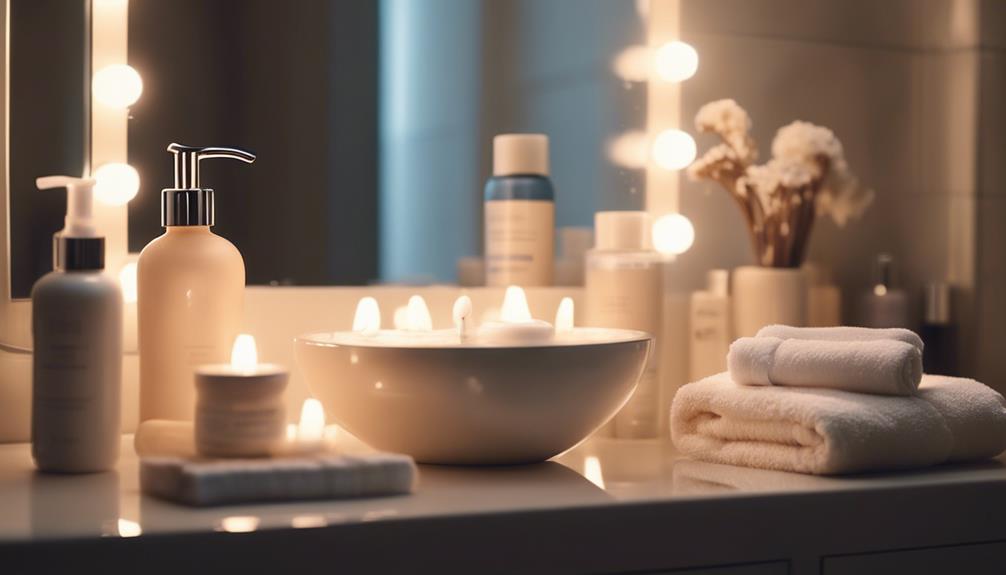
Your evening skincare routine is essential for cleansing away the day's impurities and allowing your skin to repair itself overnight.
Start with double cleansing: use an oil-based cleanser to dissolve makeup and impurities, followed by a gentle water-based cleanser to thoroughly cleanse your skin. This two-step process guarantees your skin is prepped for all the active ingredients you'll apply next.
Next, consider incorporating exfoliation 2-3 times a week. This helps remove dead skin cells and promotes cell turnover, enhancing the effectiveness of your serums and treatments. If you're targeting signs of aging, apply a retinol product at this stage; it boosts collagen production and works best at night to minimize sensitivity.
Finally, finish your routine with a nourishing night cream to lock in hydration and support skin repair. These creams are often formulated with richer ingredients, perfect for peak hydration while you sleep.
- Double cleansing removes impurities
- Exfoliation enhances cell turnover
- Retinol boosts collagen production
- Serums target specific concerns
Choosing Products for Skin Types
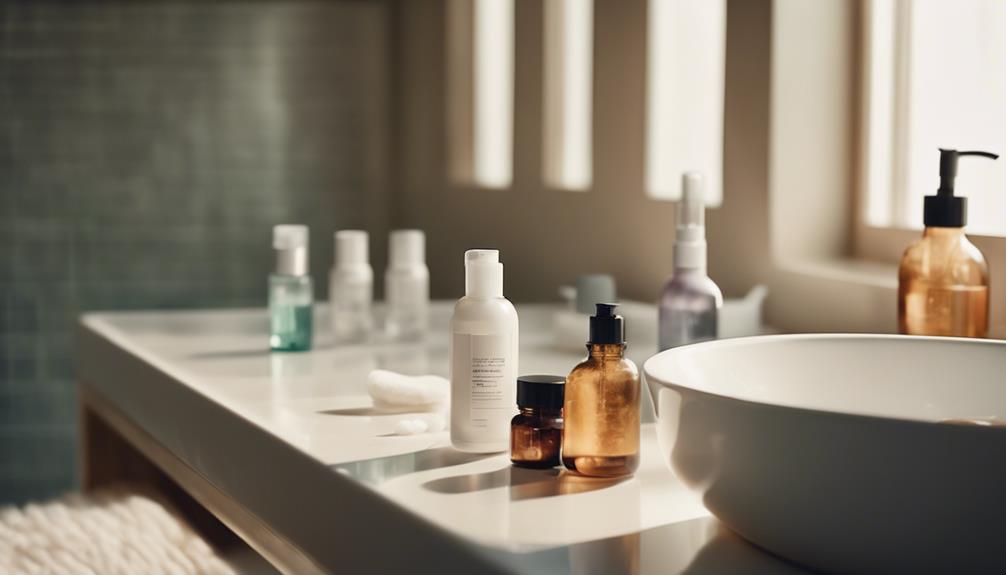
Choosing the right skincare products starts with identifying your skin type.
Each type has key ingredients that can either enhance or harm your skin, so it's essential to tailor your routine accordingly.
Let's explore how to select the best products for your unique needs.
Identifying Your Skin Type
Identifying your skin type is essential for selecting products that effectively address individual concerns and enhance overall complexion. By determining whether your skin is dry, oily, sensitive, combination, or acne-prone, you can choose tailored ingredients that suit your specific needs.
Dry skin needs hydrating ingredients like ceramides and glycerin to restore moisture and strengthen the skin barrier.
Oily skin benefits from lightweight, oil-free products that help control excess oil and prevent clogged pores.
Sensitive skin requires gentle, fragrance-free formulations to minimize irritation; patch testing new products is vital to avoid adverse reactions.
Combination skin may require different products for various areas—using lightweight gels for oily zones and richer creams for dry patches.
Acne-prone skin often responds well to products containing salicylic acid, which can help manage breakouts.
Key Ingredients for Each
Selecting the right products for your skin type hinges on understanding the key ingredients that effectively address your specific needs and concerns.
For dry skin, prioritize hydrating ingredients like ceramides and glycerin to help moisturize and support your skin barrier, both morning and night.
If you have oily skin, opt for lightweight, oil-free formulations containing salicylic acid or niacinamide to control excess oil and prevent breakouts.
For those with sensitive skin, choose gentle, fragrance-free products featuring soothing ingredients like aloe vera and chamomile to minimize irritation.
If you're dealing with combination skin, tailor your choices: use hydrating products for dry areas and lightweight, mattifying options for oilier zones.
For acne-prone skin, incorporate targeted treatments like benzoyl peroxide or salicylic acid in your evening routine for effective spot treatment and prevention, while applying gentler products in the morning.
Tailoring Routine and Products
Understanding your skin type helps you tailor your routine and products to effectively meet your unique skincare needs.
Whether you have dry, oily, sensitive, combination, or acne-prone skin, selecting the right products is essential.
For dry skin, look for moisturizers with hydrating ingredients like ceramides and glycerin.
Oily skin thrives on lightweight products that control shine and prevent clogged pores, often featuring salicylic acid.
Sensitive skin benefits from gentle, fragrance-free formulations to reduce irritation—always do a patch test with new products.
Combination skin might require different approaches for various areas; use lightweight gels for oily zones and richer creams for dry patches.
Identifying your skin type is the first step in tailoring your routine effectively.
Key Ingredients for Effective Care
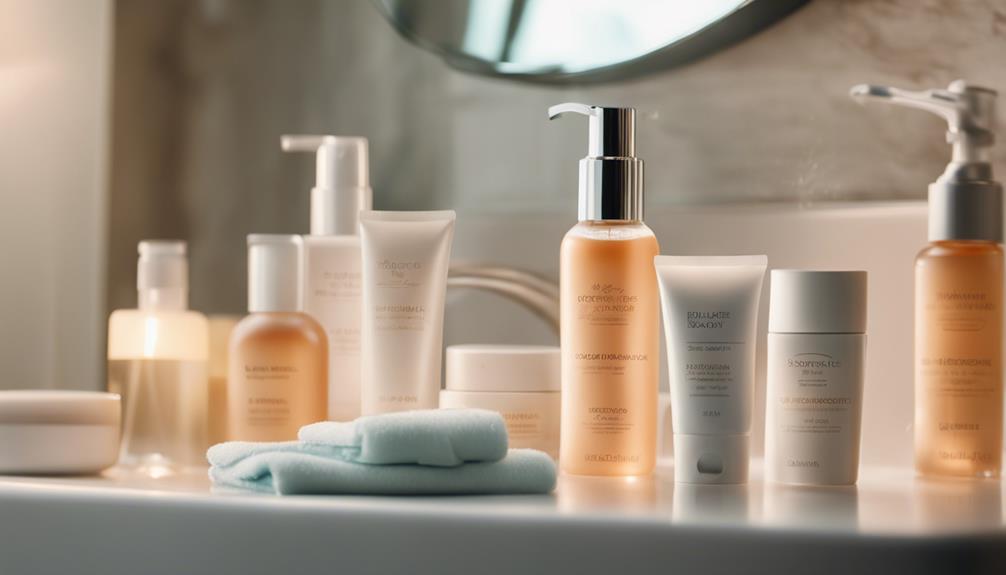
When it comes to effective skincare, knowing the right ingredients can make all the difference.
Hydrating ingredients keep your skin plump and fresh, while active ingredients target specific concerns like aging and acne.
Let's explore how these key components can enhance your routine for better results.
Hydrating Ingredients Benefits
Incorporating hydrating ingredients like hyaluronic acid and glycerin into your skincare routine can greatly boost your skin's moisture levels and overall health. These powerful components work together to enhance skin hydration and protect your skin barrier, ensuring you maintain a youthful, radiant complexion.
Here are some key benefits of hydrating ingredients:
- Hyaluronic Acid: Holds up to 1,000 times its weight in water, providing exceptional moisture.
- Glycerin: Draws moisture from the environment, keeping your skin barrier intact.
- Ceramides: Reinforce the skin's natural barrier, locking in moisture and protecting against irritants.
- Squalane: Mimics your skin's natural oils for deep hydration without clogging pores.
Active Ingredients Importance
Active ingredients play an essential role in addressing specific skin concerns, making them key components for effective skincare. By incorporating active ingredients into your routine, you can target issues like uneven skin texture, fine lines, and dullness.
For instance, Vitamin C brightens your complexion and reduces pigmentation, while retinol promotes cell turnover, helping to minimize the appearance of fine lines.
To boost hydration levels, consider using hydrating agents such as hyaluronic acid and glycerin. These ingredients attract moisture, enhancing your skin's overall texture.
In the morning, antioxidants like vitamin E are vital for protecting your skin from free radicals generated by UV exposure and pollution.
At night, exfoliating acids like AHAs and BHAs help remove dead skin cells and unclog pores, allowing your skin to replenish itself overnight. Additionally, peptides can be a game-changer for boosting collagen production, improving skin elasticity and firmness.
Moisturizers and Hydration Strategies
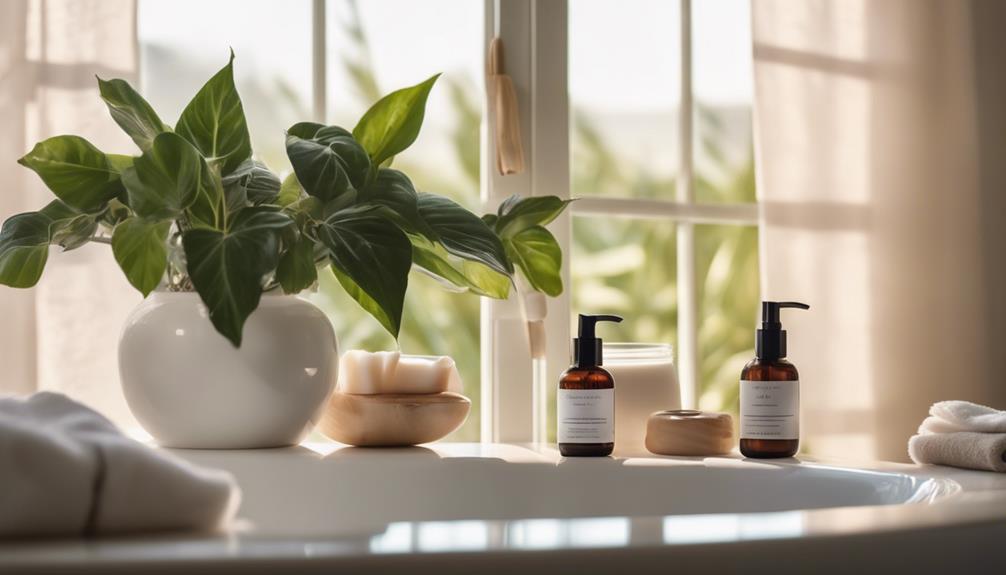
Moisturizers play an essential role in your skincare routine by locking in hydration and improving your skin's overall health. They come in various formulations tailored to your skin type, guaranteeing you get the moisture you need without excess oil or dryness.
Consider these key points when selecting your moisturizer:
- Humectants: Look for ingredients like glycerin and hyaluronic acid that attract moisture to the skin.
- Night creams: These richer formulations promote deeper hydration and skin repair overnight.
- Dry skin solutions: Choose moisturizers with ceramides and fatty acids to restore the skin barrier and prevent moisture loss.
- For oily skin: Opt for lightweight, oil-free moisturizers that hydrate without clogging pores.
Incorporating these strategies into your routine will guarantee your skin remains well-hydrated, resilient, and radiant. Tailoring your moisturizer choices according to your specific needs will help you maintain a balanced complexion, whether you're dealing with dryness or excess oil.
Importance of Sun Protection
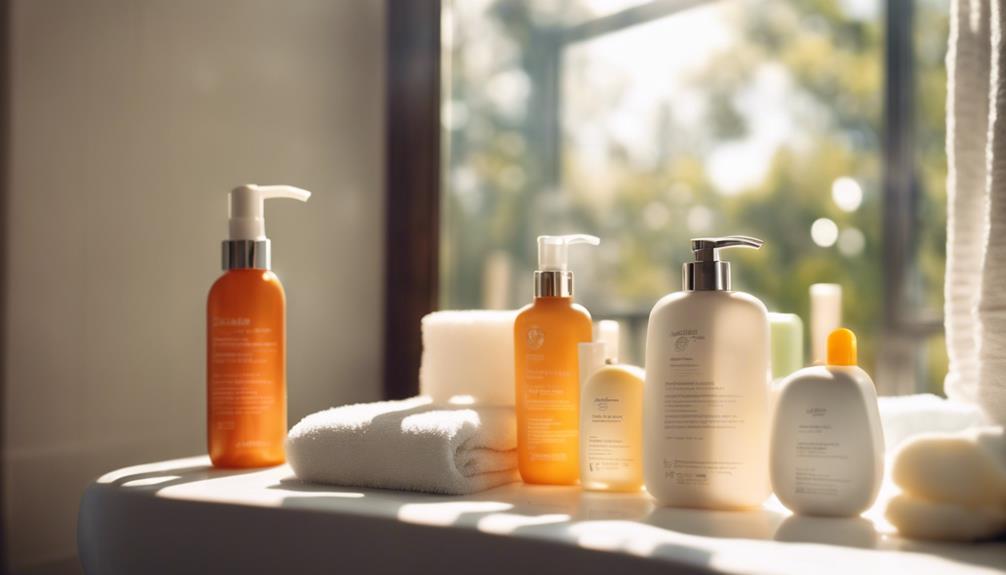
Even with a solid moisturizing routine, protecting your skin from the sun's harmful rays is crucial for maintaining its health and preventing damage. Daily sun protection is essential since UV rays can cause skin damage, premature aging, and an increased risk of skin cancer. You should incorporate broad-spectrum sunscreen into your morning skincare routine, as it shields your skin from both UVA and UVB rays.
Here's a quick overview of the importance of sun protection:
| Aspect | Details | Recommendation |
|---|---|---|
| Sunscreen Type | Broad-spectrum | Protects against UVA/UVB |
| SPF Level | At least 30 | Higher for fair/sensitive skin |
| Application Frequency | Every 2 hours | More if swimming or sweating |
| Morning Routine Inclusion | Crucial for daily skincare routine | Apply before makeup |
| Skin Cancer Prevention | Reduces risk of skin cancer | Consistent daily use |
Tips for Consistency and Success

Creating a consistent skincare routine starts with setting aside dedicated times each morning and evening for your essential steps. This habit helps improve consistency and guarantees you effectively apply your products.
Here are some tips that can help you stay on track:
- Set reminders: Use your phone or calendar to prompt you for your morning and evening routine.
- Make products accessible: Keep your skincare items visible to encourage regular usage and minimize skipped steps.
- Track your skin's progress: Document changes in a journal or through photos to evaluate how well your routine is working.
- Hydrate your skin: Always make sure you're incorporating hydration in both your morning and evening routines for healthy skin.
Is it necessary to have different skincare routines for morning and night?
Yes, it is necessary to have a complete skincare routine schedule for both morning and night. Different routines cater to different skin needs throughout the day. The morning routine focuses on protection and hydration, while the night routine focuses on repair and rejuvenation. It’s important to have both for optimal skin health.
Conclusion
Incorporating a consistent skincare routine can transform your complexion and boost your confidence.
By blending beneficial products, prioritizing protection, and personalizing your approach, you'll reveal the secret to radiant skin day and night.
Remember, commitment is key; stick to your regimen, and your skin will shine.
So, embrace these easy essentials and experience the extraordinary effects of dedicated daily and nightly care.
Your journey to glowing skin starts now—let it illuminate your life!









